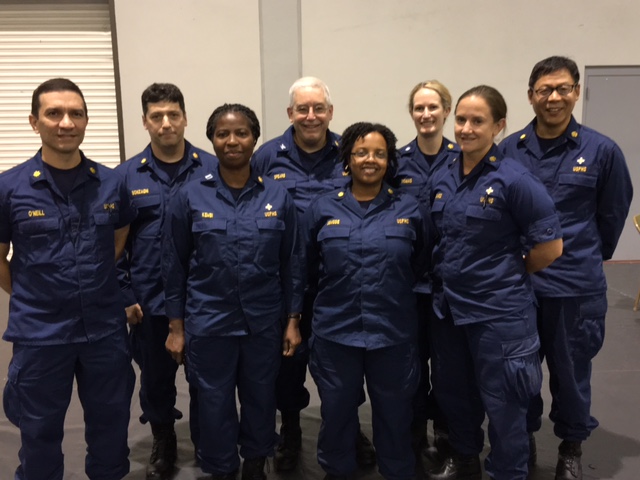2016 deployment to Baton Rouge on Rapid Deployment Force #3
By LCDR Neil Bonzagni
First-time deployments are always filled with some degree of anxiety and uncertainty. This was especially true of my recent deployment to Baton Rouge on Rapid Deployment Force #3, in support of the 2016 Louisiana Major Flooding Response effort. Questions abound in the time leading up to an officer’s deployment. What conditions will I encounter on deployment? Have I packed accordingly for this deployment? Will my family be OK in my absence for two weeks? Who will take care of routine tasks at home and at work while I’m away? For those of us who have grown accustomed to being able to plan accordingly for uncertainty in our day-to-day lives, these questions can seem imposing prior to a deployment. The simple fact is that many of these questions will be left unanswered as you prepare to leave things behind, which is not a problem if you resign yourself to remaining flexible and ready for new challenges throughout your deployment experience.
While deployed to Baton Rouge, I thus tried as best I could to account for those things I could exercise some control over. I was reminded of my past experiences while in the Navy Medical Service Corps, in which service members were prompted beforehand to ensure that they were prepared for deployment. Among the litany of things to accomplish in the pre-deployment checklist was the requirement for a ‘wellness visit’ with the medical department, during which, service members would have a medical record review to ensure that their shots or immunizations were current, and that there were no medical conditions that might preclude them from deployment. It also involved ensuring that things were accounted for on the home front.
Today, Public Health Service officers find themselves managing these things on their own, but there are some useful resources that can help officers prepare. First, lean on your team mates on your deployment team who have past deployment experience. These individuals have a wealth of knowledge as to what to expect during deployment, and how to prepare for austere conditions. Second, pay close attention to safety briefs from your team’s leadership prior to deployment, especially with regard to environmental hazards that might be present during deployment. And third, utilize your local Federal Occupational Health clinic to help in performing a review of your immunization and medical records, and to document immunizations on a Yellow Card (CDC-731) if necessary for foreign travel.
In the end, the adage that you are of no help to others if you yourself become a casualty rings true.
Other considerations prior to deployment include establishing power of attorney arrangements with trusted friends or family members, making arrangements for financial matters or obligations, and ensuring that you have a will. The local Judge Advocate General’s (JAG) office at a Department of Defense facility in your area may be able to help regarding drafting a will. Finally, consider the expression that chance favors the prepared. Do what you can to maintain your own situational awareness by observing news and weather bulletins for the area of your deployment.
Even with this prior planning, things can and will go awry, as was the case for me during the Baton Rouge deployment. Flight itineraries can and often will contain errors, billeting can be subject to frequent change, and ground transportation can present challenges. The manner in which you marshal resources and the fortitude necessary to meet these challenges will be the difference between a successful or unsuccessful deployment. Remain flexible and remember that you are but part of the public health solution being brought to bear on the larger problem for which you have been deployed. This is true also for your deployment role, in which you may be asked to assist or augment other sections of your deployment team you have not previously worked with. While part of a Federal Medical Station in Baton Rouge, I also found out that everyone was responsible for patient care, regardless of whether or not they were a clinician. Simple tasks like assisting a patient to his or her cot, finding and using a wheelchair for patient movement, or assisting in patient record entry are examples of where I found I could provide additional help or assistance.
In the end, I found the deployment to Baton Rouge incredibly rewarding, in that it serves as a reminder of why we all originally chose to wear the uniform. Not only did I see countless examples of selfless service from my fellow officers, but I also observed an eagerness and willingness to serve among the National Disaster Medical System colleagues with whom we worked throughout the deployment. For me, the experience was a renewal of an enthusiasm to serve and to advance, promote, and protect the nation’s public health. So stand tall, and be proud to be a member of the world’s finest public health response team.

Next Deployment Narrative Back to Deployment Narrative homepage